Gardening safely – tips for reducing risk
Key points about reducing gardening risks
- Planting, weeding and getting the garden into shape is not without its risks!
- Gardening is incredibly popular here in Aotearoa New Zealand. It keeps you fit, it’s enjoyable, it gets you outdoors and lets you grow your own fruit and vegetables.
- However, there are a few hazards that can spoil your enjoyment.
- Here are our top tips for staying safe in your garden.
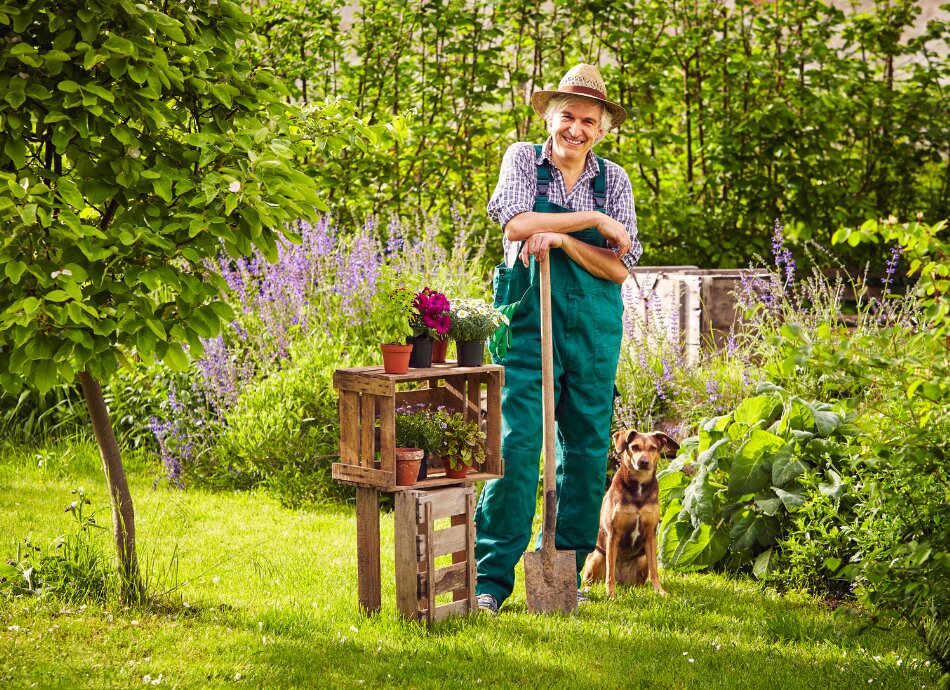
Legionnaire's disease is caused by an organism that lives in moist conditions and can cause a type of pneumonia. Legionella can be found in compost, potting mix, soil and mulches and you can catch it by breathing in airborne particles.
To reduce the risk of developing Legionnaire’s disease, wear a face mask when working with potting mix or compost, to avoid inhaling dust that may contain the bacteria. If you’re working indoors, make sure the area is well ventilated. It also pays to read the warning label on bags of compost or potting mix carefully. Gently dampening soil-type products with water helps reduce the amount of dust.
Important: See your doctor if you develop flu-like symptoms after working in the garden.
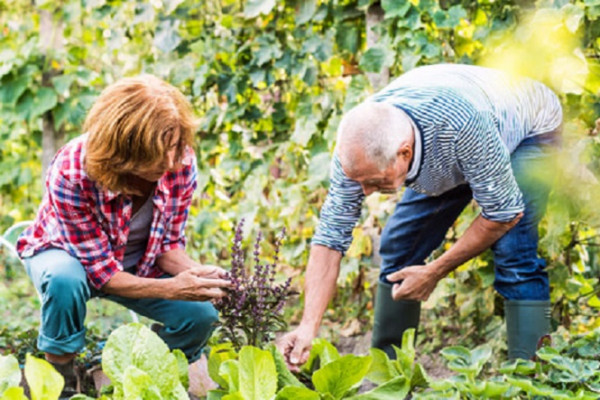
Image credit: Canva
Tetanus is caused by bacteria called Clostridium tetani. These bacteria are commonly found in soil, and the manure of animals such as horses and cows, and can enter your body through a wound. Once in your body, the bacteria can quickly multiply and release a toxin, affecting your nerves and causing symptoms such as muscle stiffness and spasms. It's important to check with your doctor to make sure you're up to date with your tetanus vaccination.
Wearing gardening gloves protects your hands from cuts and abrasions, and reduces the risk of infections such as tetanus. If you do cut yourself, clean the area thoroughly with warm water. If you return to the garden, ensure the cut is completely covered up. Covering the wound prevents bugs from getting into it and causing an infection. Most cuts, scratches and grazes will heal by themselves after a few days but if you notice signs of infection such as pus, swelling and redness talk to your doctor or pharmacist. Read more about cuts and grazes.
Similarly, closed shoes (not sandals) protect your feet from cuts and scrapes and reduce the risk of injury if you accidentally stand on a sharp gardening tool.
Use and store garden sprays and chemicals according to the instructions and keep them out of reach of children. Try to buy only the amount you need and make sure you dispose of them correctly (check with your local council).
Contact the New Zealand National Poisons Centre on 0800 764 766 if you’re concerned you or a family member has ingested a chemical.
Always wash your hands carefully after using chemicals or handling soil, even if you have been wearing gloves. Try not to eat, drink, smoke or place your hands near your face while you are gardening.
Bee, wasp and spider bites usually only cause minor irritation to most people. Wearing gloves will help protect against bites. Look out for the tell-tale sign of the black garden tunnel-web spider lurking in your garden with its thick, white, sheet-like web.
Learn more about bites and stings.
Make sure you know how to use machinery such as lawnmowers, chainsaws, hedge trimmers and wood chippers correctly. Keep them in good working order, keep children away while they're in use and wear the appropriate protective equipment. If you’re using a ladder to reach high places, make sure it’s secure. Put tools away safely when not in use.
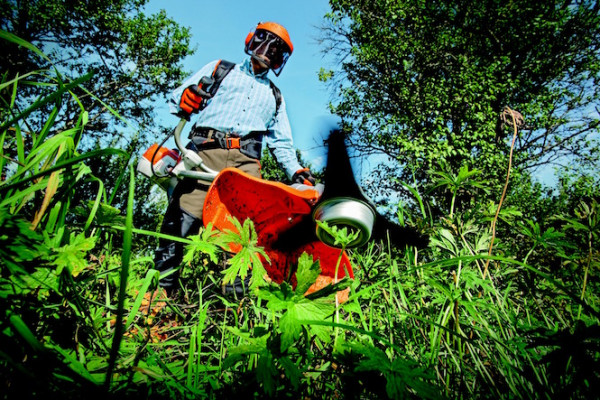
Image credit: Pixabay
Slip, slop, slap and wrap. Aotearoa New Zealand has one of the highest rates of melanoma in the world. To protect yourself from the sun’s harmful rays make sure you cover yourself up. Wear a wide-brimmed hat, long sleeves and use a broad-spectrum sunblock. If you can, garden in the morning or evening when it’s cooler and make use of natural shade. UV radiation from the sun is the highest between 10am and 4pm during daylight saving months. Sunglasses protect your eyes from the sun and also from any spiky plants that may stab you in the eye. Learn more about sun safety.
Gardening is a physical activity and coupled with the heat from the sun, it’s easy to get dehydrated. Make sure you keep your fluids up with plenty of water.
Gardening can cause aches and pains, especially if you haven’t done it for a while. Do some stretches before you begin, don’t stay in the same position for too long and take regular breaks. Use a cushion while kneeling or other types of support to minimise aches and pains. If you’re doing any heavy lifting, bend your knees to avoid injury or get someone to help you.
Happy gardening!
Safer and healthier gardening(external link) HealthEd, NZ, 2022
Working safely with soil, compost and potting mix(external link) Worksafe – Mahi Haumaru, Aotearoa NZ
Plants, gardening and asthma(external link) Asthma Respiratory Foundation NZ, 2010
Brochures
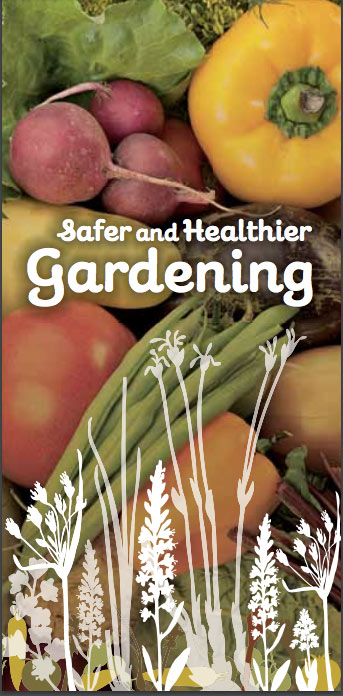
HealthEd, NZ, 2022
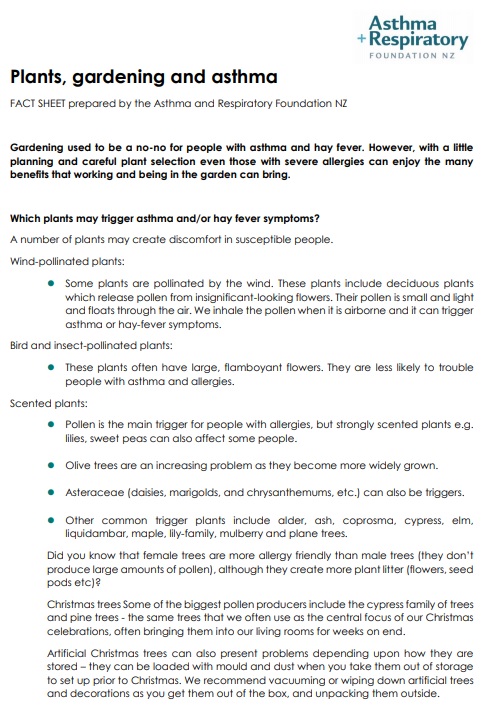
Asthma Respiratory Foundation NZ, 2010
Credits: Healthify editorial team. Healthify is brought to you by Health Navigator Charitable Trust.
Page last updated:





